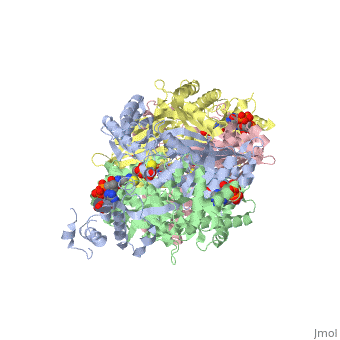User:Stephen Mills/Peptide tutorial 1
From Proteopedia
(Difference between revisions)
(→Which amino acid this is?) |
(→Which amino acid this is?) |
||
| Line 8: | Line 8: | ||
<Structure load='arg.pdb' size='300' frame='true' align='left' caption='' scene='User:Stephen_Mills/Sandbox_2_Peptide_tutorial/Arginine/2' /> | <Structure load='arg.pdb' size='300' frame='true' align='left' caption='' scene='User:Stephen_Mills/Sandbox_2_Peptide_tutorial/Arginine/2' /> | ||
| + | ==First Amino Acid==<StructureSection load='1dq8' size='300' side='right' caption=' ' scene=''>Scroll down when you know what it is</StructureSection> | ||
| + | |||
| + | <Structure load='arg.pdb' size='300' frame='true' align='left' caption='' scene='User:Stephen_Mills/Sandbox_2_Peptide_tutorial/Arginine/2' /> | ||
| + | |||
| + | ==First Amino Acid==<StructureSection load='1dq8' size='300' side='right' caption=' ' scene=''>This is Argining (Arg, R), an amino acid with a positively charged side chain. | ||
| + | Identify the alpha-amino and alpha-carboxy groups involved in peptide bond formation. | ||
| + | You can rotate the amino acid by holding down the left mouse button and dragging. | ||
| + | </StructureSection> | ||
Revision as of 06:50, 23 July 2011
Biochemistry Tutorial #1 - Peptides
The alpha amino acids polymerize, or bond, through the elimination of a water molecule. Polymers composed of two amino acid residues are known as dipeptides. Longer polymers are called oligopeptides (up to around 20 amino acids) or polypeptides (> 20 amino acids). Proteins can contain any number of amino acids linked together but each has a unique length (number of amino acids) and sequence (the identity and order of amino acids in the polymer).
In this excercise, you will identify amino acids, the amino and carboxy groups involved in the peptide bond, look at peptide bonds and oligopeptide structure and finally also examine disulfide bonds.
Which amino acid this is?
|
| |||||||||||
|
| |||||||||||

